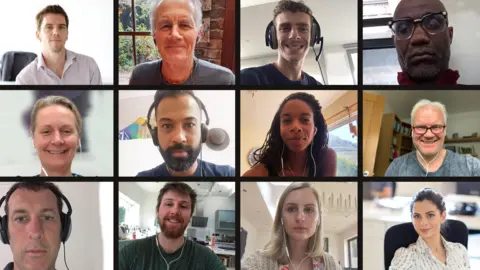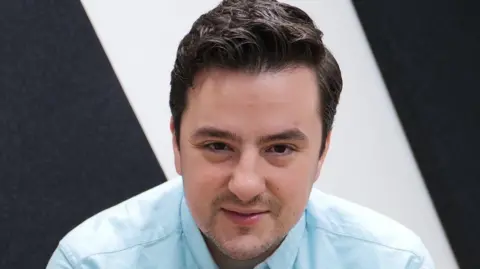Sci-Tech
Can we make work meetings more bearable?

By Jane Wakefield, Technology reporter
 Jaime Teevan
Jaime TeevanWork meetings can sometimes be incredibly powerful.
Like the one Jaime Teevan, chief scientist at Microsoft, says she had a few years ago with her chief executive Satya Nadella, and Sam Altman the founder of leading AI firm OpenAI.
It had such a visceral impact on Ms Teevan that afterwards she sat in her car and screamed, elated at the possibility of AI.
“I have never done that before, but there was just too much emotion,” she says.
The meeting was a demonstration of the potential of OpenAI’s now popular AI chatbot ChatGPT. And it left Ms Teevan convinced that AI could be on the verge of transforming many things, including meetings.
“Historically computing has been quite good at helping make the drudgery more efficient,” she says. “But having something that can help throw out a bunch of ideas, and be able to reflect on those, that really feels qualitatively different, and like a real opportunity.”
However, while Ms Teevan will long remember that specific work meeting, for most of us such gatherings with colleagues can be drudgery.
Elon Musk once said that “excessive meetings are the blight of big companies and almost always get worse over time”. Few would disagree.
Meanwhile, 72% of meetings are ineffective, according to one global study.
And your brain activity drops when you have a Zoom meeting, says a report by researchers at Yale University in the US, and the UK’s University College London.
Yet as a result of the coronavirus pandemic, a great many businesses and organisations were forced to move their meetings online back in 2020, with everyone sat in front of a webcam.
And like them or loath them, video meetings are here to stay, via the likes of Zoom, Microsoft Teams, and Google Meet.
 Getty Images
Getty ImagesMs Teevan says this switch was “fortuitous” because it “created the opportunity for AI to [positively] impact our meetings”.
The three big providers of video meetings technology certain think this is the case, and all now offer users AI-powered assistants. Zoom has AI Companion, Teams has Copilot, and Meet has Duet AI.
Rapidly expanding functions already include the AI transcribing the meeting for you, suggesting questions you might want to ask, summarising the meeting in point form, reminding you of who else is present, or even in the case of Meet – its AI attending an online meeting on your behalf.
Husayn Kassai is the founder of London-based start-up Quench AI, which makes AI-powered training software.
He predicts that in the future “everyone in the workforce will have some sort of AI coach accompanying them” to meetings.
“Meetings are going to be a lot more productive, because we will be going into them much better informed, and able to make useful and more valuable judgements,” says Mr Kassai.
He adds that workers will use AI “to help get them clued up and give them a breakdown of the information”.
As a result, he says meetings will start to accomplish things, unlike now, because “people aren’t talking about stuff that matters because they are not prepared”.
Mr Kassai also envisages AI acting as a kind of moderator, offering feedback after the meeting, perhaps even pointing out the things the humans in the room feel unable to.
“When you have an idiot in the meeting room who goes off on a rant, and someone who doesn’t say much… the AI could say things like ‘speaker three, you only spoke 2% of the time and next time you need to speak 20% of the time’.”
 Husayn Kassai
Husayn KassaiMs Teevan claims that Copilot is already having “a pretty significant impact” on people’s video meetings. “People are able to summarise meetings four times faster.”
Yet as numerous reports over the past year have indicated, AI isn’t yet foolproof, and can make mistakes, or as they are also called, “hallucinations”.
In response to the old adage “garbage in, garbage out”, Ms Teevan says Microsoft is currently doing a lot of work to ensure that Copilot’s “AI prompting” is as good as possible.
AI prompting refers to the AI giving the best possible answer to the user’s question. To do this, it needs to be able to learn as quickly as possible who the user is, what he or she does as a job, and which answers they are most likely to want.
“One of the most common ways that I use AI is to ask it what questions I should ask in a meeting,” says Ms Teevan.
To get the correct answers from the AI, Ms Teevan says it has to “understand that I’m a research scientist and executive at Microsoft”.
Business psychologist Jess Barker says it is easy to understand why so many of us don’t like work meetings. “The data suggests, as does our experience, that most meetings are time consuming and ineffectual.”
She is also “not convinced that the general level of frustration will disappear altogether” thanks to AI. “I think we may find that we continue to be frustrated with meetings, but for different reasons – such as, annoyance with person A who never shows up to the Monday morning meeting, but instead requests that the AI tool attend on their behalf.
“Or frustration with the person who turns up late to every meeting, and uses the AI tool to update on what they’ve missed so far. I can see how this could result in increased resentment and mistrust between colleagues.”
Yet Microsoft’s Ms Teevan is convinced that AI will help to improve meetings. “It can help people feel less overwhelmed, it can help them get started and check things off their list. And it can help spark ideas, seeing things in news ways and getting support there.”
Sci-Tech
Cristiano Ronaldo first to hit 1bn social media followers

Cristiano Ronaldo has hit 1bn total followers across his various social media accounts – making him the first person to reach that mind-boggling figure.
The number is calculated by combining his total number of followers across Instagram, Facebook, Twitter, YouTube, and Chinese social media sites Weibo and Kuaishou.
It does not equate to one billion individual followers, as many people will follow him across multiple platforms, and some will be fake accounts, known as bots.
Nonetheless social media expert Paolo Pescatore, from PP Foresight, described it as a “staggering number” that media and brands would pay close attention to.
“What an achievement, and it further underlines the fundamental shift taking place in media.”
It showed “the power to reach new, younger audiences thanks to technology”, he told the BBC.
On the pitch, Ronaldo was famed for his rivalry with Argentinian star Lionel Messi.
But off it, there is no competition for who is winning the social media contest – Messi has a mere 623 million followers.
Some of the other celebrities with the biggest presence on social media are:
- 690m: Selena Gomez, actor/singer
- 607m: Justin Bieber, singer
- 574m: Taylor Swift, singer
Other notable names the BBC looked into include The Rock (557m), Kylie Jenner (551m ) and Ariana Grande (508m).
MrBeast, the top YouTuber in the world, has 543m total followers, while WWE, often considered to have an enormous social media presence, can only point to reaching a quarter of the audience of Cristiano Ronaldo with 268m combined followers.
The footballer will have reached this milestone thanks to his decision to join YouTube last month, where his channel rocketed to 50 million subscribers within a single week.
So far, the channel consists mainly of conversations between Ronaldo and his wife Georgina Rodríguez, as well as his former Manchester United colleague Rio Ferdinand.
He announced the news in a post shared across his various social media platforms.
Cristiano Ronaldo has made a career out of breaking records.
His successes include being top scorer in Uefa Champions League history, having the most goals in the European Championship, and making more international appearances than anyone else.
Last week he became the first footballer to score 900 top-level career goals.
As with his playing career, he still has scope to improve his numbers on social media too, as unlike some of his rivals, he is not on TikTok or Threads.
All of which is likely to add to another figure he dominates: earnings.
According to Forbes, his total earnings now stand at $260 million – the highest of any athlete.
Sci-Tech
Musk and Zuckerberg have ‘polluted culture’

Meta boss Mark Zuckerberg and X owner Elon Musk are “the worst polluters in human history”, Stephen Fry has said.
The actor and comedian made the claim during a lecture at Kings College, London.
“You and your children cannot breathe the air or swim in the waters of our culture without breathing in the toxic particulates and stinking effluvia that belch and pour unchecked from their companies into the currents of our world,” he said of the pair.
The BBC has approached the two men’s companies for comment.
Mr Fry has a track record of being an early adopter of technology – and was once a regular poster on X, when it was known as Twitter.
He stopped posting in 2022, a few months after the platform was purchased by Mr Musk, but has retained his account. He is no longer active on any social networks.
“I’m the chump who thought social media could change the world,” he told his audience at the Digital Futures Institute.
He said he was at first enthusiastic about the potential of social media to unite people around the world and bring about positive change in society, citing the Arab Spring protests which were coordinated online as an example – but added that he had been proved wrong.
He described what he considered to be a fatal flaw in attempts by early Facebook algorithms to “maximise engagement”, saying nobody had predicted that engagement would be “most maximised by… the worst passions” such as anger, shock and horror.
“We are decidedly hopeless at knowing where technology will take us or what it will do to us,” he said.
He returned to the theme several times throughout his one hour speech, in which he also considered the future of artificial intelligence.
Mr Fry argued that AI was “poised to disrupt every space we have”.
He said he hoped corporate greed would not corrupt the development of AI tech at the expense of safety.
“The best I can do is this – Einstein and Russell said in their manifesto on nuclear weapons – we appeal as human beings to human beings, remember your humanity and forget the rest,” he said.
Mr Fry’s broadside was not the only attack on Mr Musk.
Earlier on Thursday, senior Meta executive Sir Nick Clegg, talking at Chatham House, in London, had been similarly scathing of Mr Musk’s platform X.
The former deputy prime minister called it “a tiny, elite, news-obsessed, politics-obsessed app” and added that in his view the social network had become “a one-man hyper-partisan hobby horse.”
In March 2024 X claimed to have 550 million monthly visitors. Facebook has just over 3bn.
Additional reporting by Liv McMahon
Sci-Tech
Vodafone clashes with UK’s competition watchdog over Three merger

Vodafone and Three have rejected claims by the UK’s competition watchdog that their proposed merger would lead to higher prices for millions of mobile users.
The Competition and Markets Authority (CMA) has “provisionally concluded” the deal would weaken competition between mobile networks.
It has particular concerns that customers who are least able to afford mobile services would be most affected.
The findings are the latest from the CMA’s ongoing probe into the merger, which it launched in January.
The regulator will now consult on its findings and potential solutions to its worries over competition.
These solutions could include legally binding investment commitments, and measures to protect both retail and wholesale customers.
Vodafone’s CEO for European Markets, Ahmed Essam, told the Today programme, on BBC Radio 4, that he still believed the merger would make a better network for customers, and add to the competition in the market.
“We’ve made a significant commitment to an £11bn investment,” he said.
“We’re willing to make sure that this is legally binding, and we undertake a commitment to deploy this.”
He also said the firm had already traded part of its radio spectrum with a competitor.
But the CMA said it is “not convinced” that it would be good for consumers.
“The main knockback to the merging parties is that the CMA considers claims of superior network quality post integration to be “overstated”,” said Kester Mann from analysis firm CCS Insight.
But he said the regulator was not shutting the door on the deal.
“Vodafone and Three should be encouraged by the tone of the CMA’s report, which appears more open to the merger than I was expecting.”
But Rocio Concha, director of policy and advocacy at consumer group Which?, took a different view.
“The regulator’s finding has set a high bar for the merger to proceed,” she said.
“It is clear from those findings that the planned merger between Vodafone and Three could have a negative impact on millions of consumers.”
But she warned it would be “challenging” for the regulator to find remedies for its concerns.
Vodafone and Three revealed plans to merge their UK-based operations in June last year, creating the biggest mobile network in the UK with around 27 million customers.
But the CMA provisionally concluded on Wednesday that such a deal would lead to a “substantial lessening in competition”.
In addition to worries over price and service levels, the regulator is also concerned that the deal may make it more difficult for smaller players such as Lyca Mobile, Sky Mobile and Lebara – who rent space from the bigger operators – to get a good deal.
Vodafone and Three have said the tie-up would lead to an additional investment of £11bn in the UK.
The CMA found that a merger of the two could improve the quality of mobile networks and accelerate next generation 5G networks and services, as claimed by the companies.
But it considered these claims were “overstated”, and that the merged firm would not necessarily have the incentive to carry out planned investment after the merger.
In a statement, Vodafone and Three said they disagreed with the CMA’s findings.
“By all measures, the merger is pro-growth, pro-customer and pro-competition. It can, and should, be approved by the CMA,” they said.
The CMA will issue a final report into the deal in December.
The firms added they would be working with the regulator to secure approval for the tie-up.
-

 African History5 years ago
African History5 years agoA Closer Look: Afro-Mexicans 🇲🇽
-

 African History8 months ago
African History8 months agoBlack History Facts I had to Learn on My Own pt.6 📜
-

 African History5 years ago
African History5 years agoA Closer Look: Afro-Mexicans 🇲🇽
-

 African History1 year ago
African History1 year agoMajor African Tribes taken away during the Atlantic Slave Trade🌍 #slavetrade #africanamericanhistory
-

 African History1 year ago
African History1 year agoCameroon 🇨🇲 World Cup History (1962-2022) #football #realmadrid #shorts
-

 African History1 year ago
African History1 year agoWhat did Columbus Find in 1493? 🤯🔥🔥 #history #civilization #mesoamerica #africa #kemet
-

 African History8 months ago
African History8 months agoBlack History Inventors: Mary Kenner 🩸
-

 African History1 year ago
African History1 year agoOrigin Of ‘Cameroon’ 🇨🇲😳#africa

























